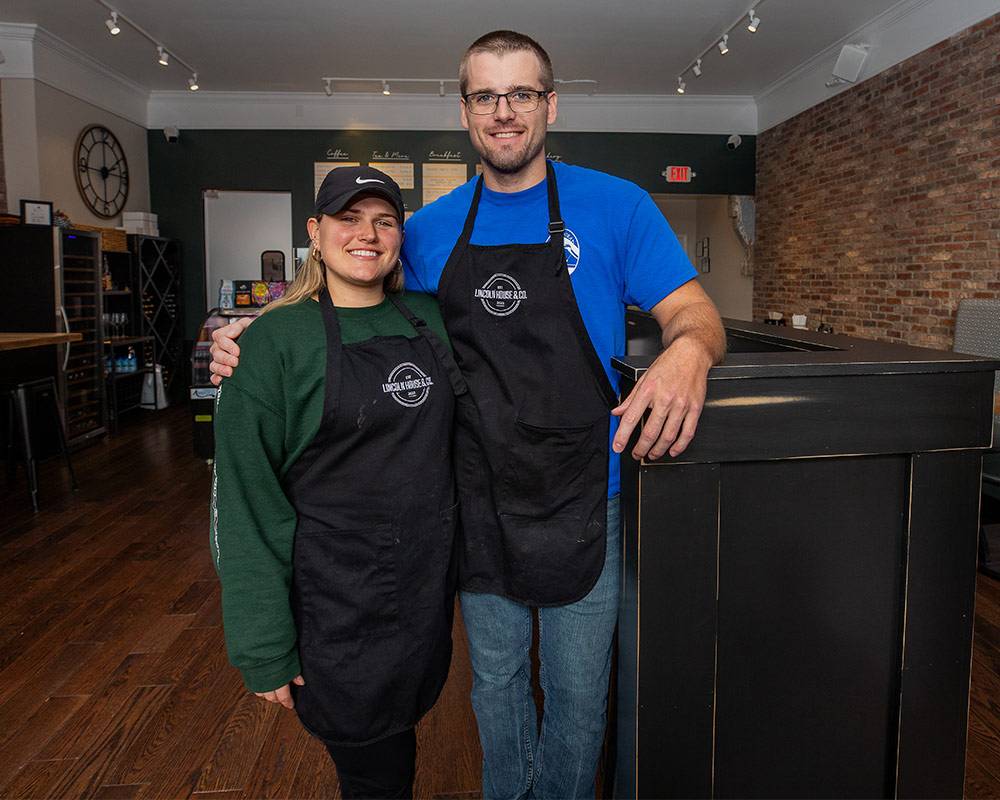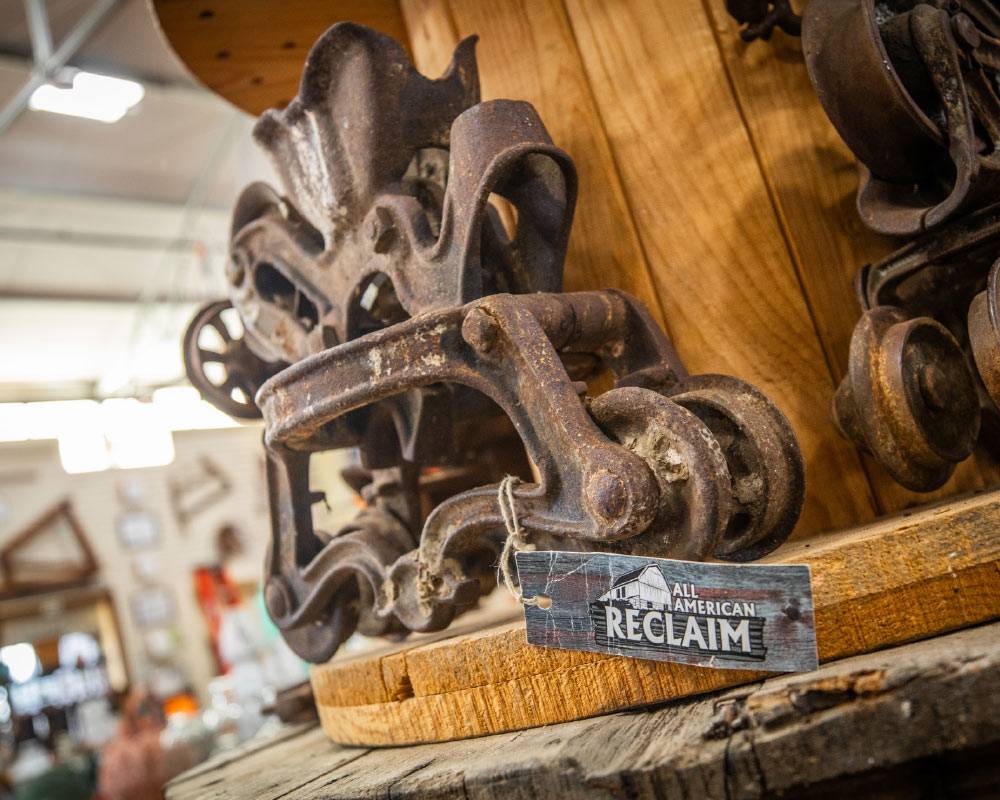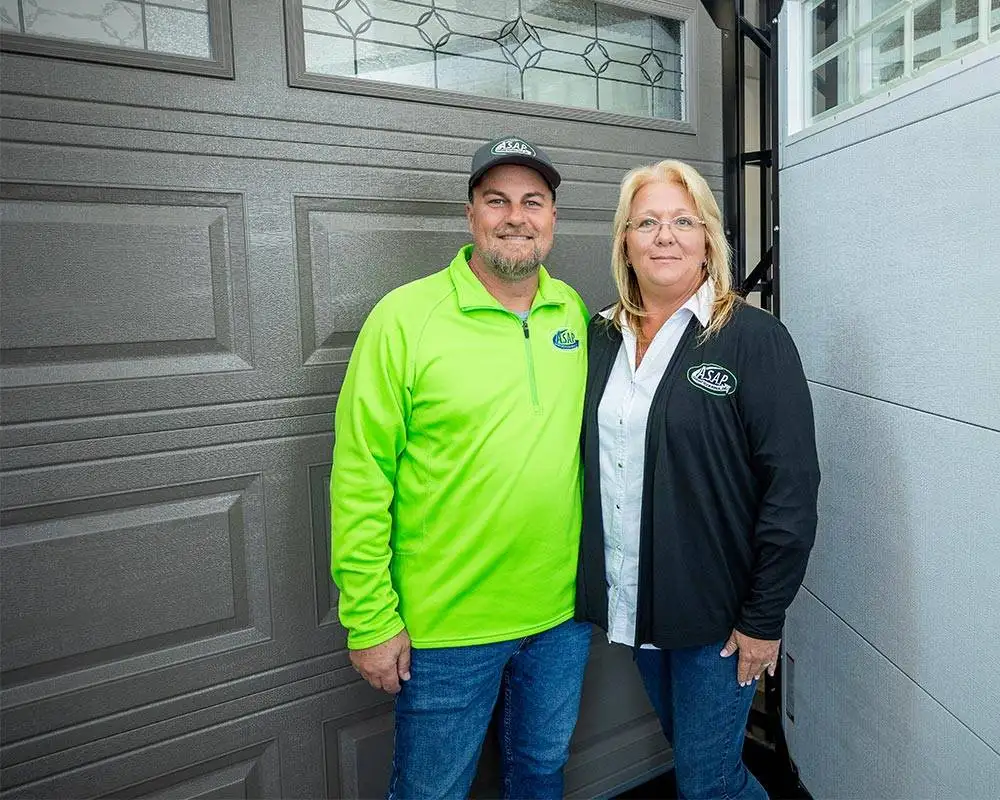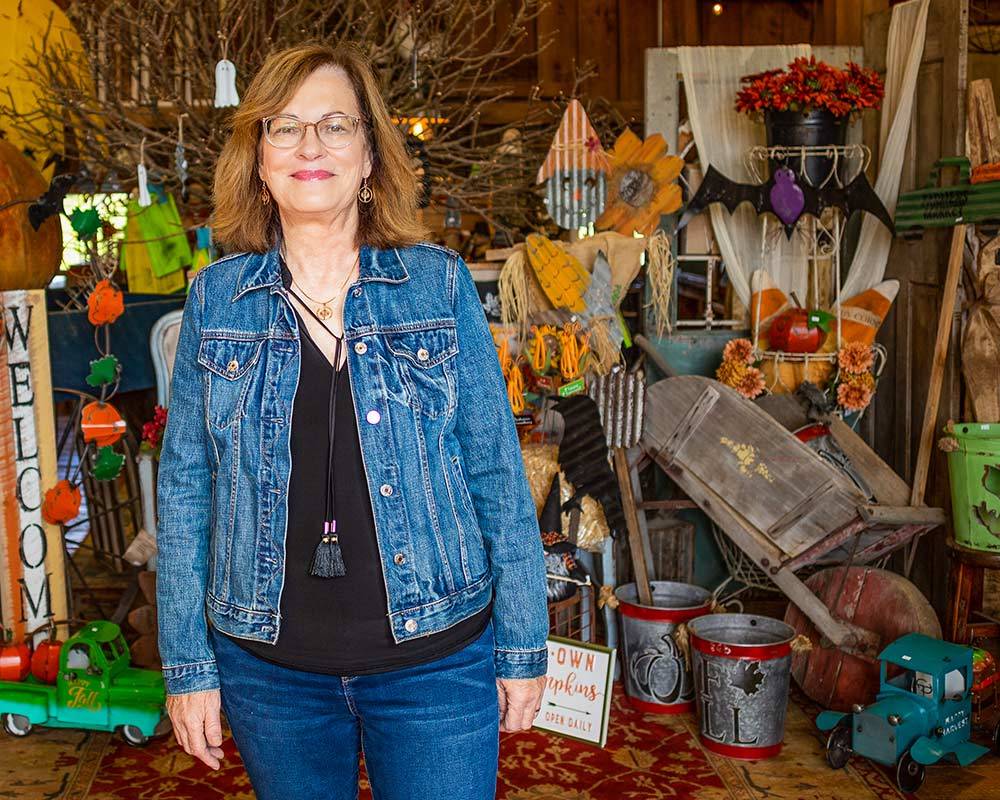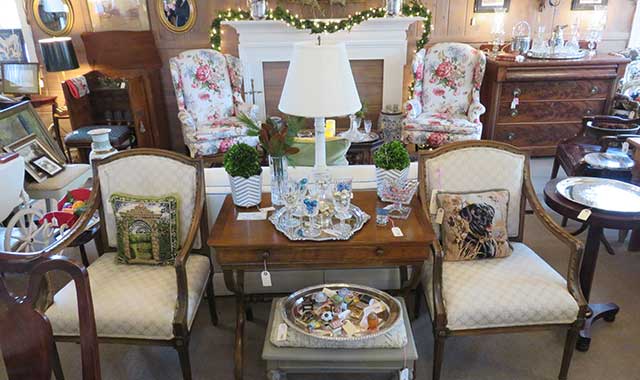What happens when the customer becomes the supplier? A whole new business model was the catalyst for this growing destination company.
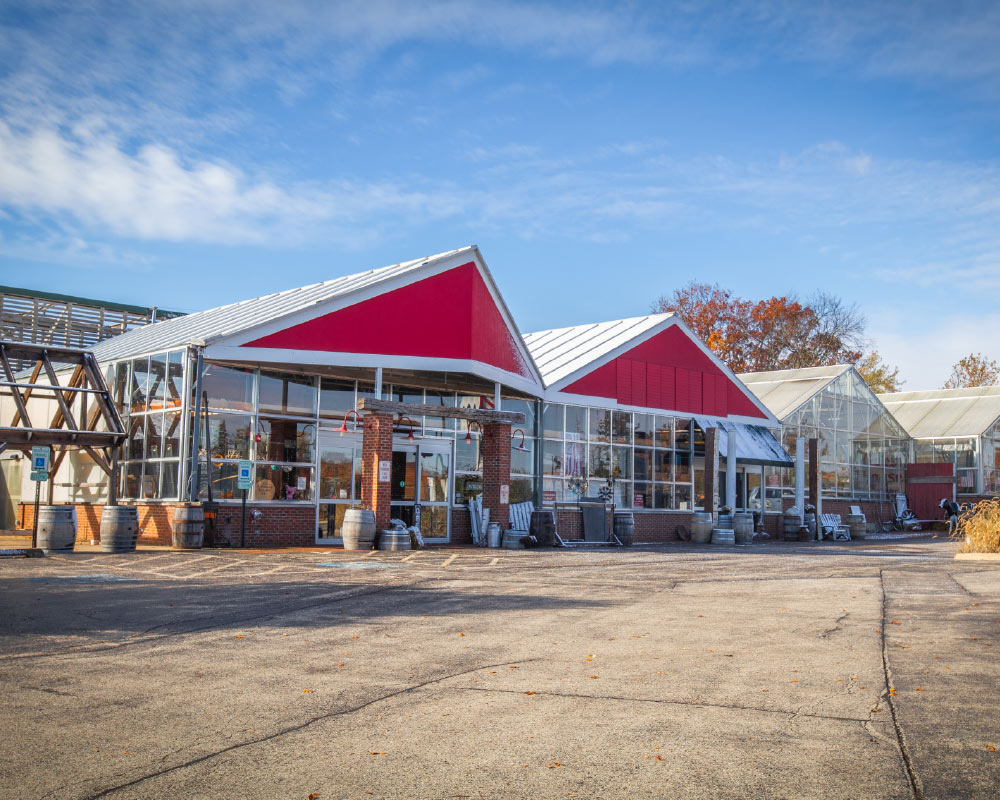
Andy Michaelis stood at a crossroads in 2013. The market for custom furniture demanded more projects made from reclaimed wood, yet sourcing it was taking the former union carpenter farther and farther from his northwest suburban home. Something had to change.
And then it hit him: If a carpenter in the Chicago area couldn’t find a local supplier, how many others were in the same situation? What if he became that local supplier?
So, he did. Michaelis located an old barn, took it apart and sold off the lumber. That led to another barn and more barns, followed by a stream of customers who wanted not only the barn wood but the other antique goods that often accompany Midwestern barns.
Ten years later, All American Reclaim is one of the Midwest’s largest dealers of reclaimed wood and salvaged materials. The company’s current location, at 990 W. Northwest Highway in Lake Barrington, is a testament to the power of Michaelis’ original idea. The company’s 3-acre property is packed with an astounding variety of finds. On the pavement outside sit great stacks of graying timbers and planks. Inside the 22,000-square-foot retail showroom there’s everything from old barn wood and harvested trees to old wash basins, hinges and knobs, hardware, hand tools, barrels, antique fixtures and much more.
Each piece tells a story of days gone by, but it also offers the promise of a new life – just as Michaelis found in adjusting his business outlook.
“It was definitely a big leap of faith to try and do something completely different and new and off the wall,” he says. “Thankfully, my wife had faith in me and let me go do this crazy thing. That and a lot of faith in God have gotten us to where we are today.”
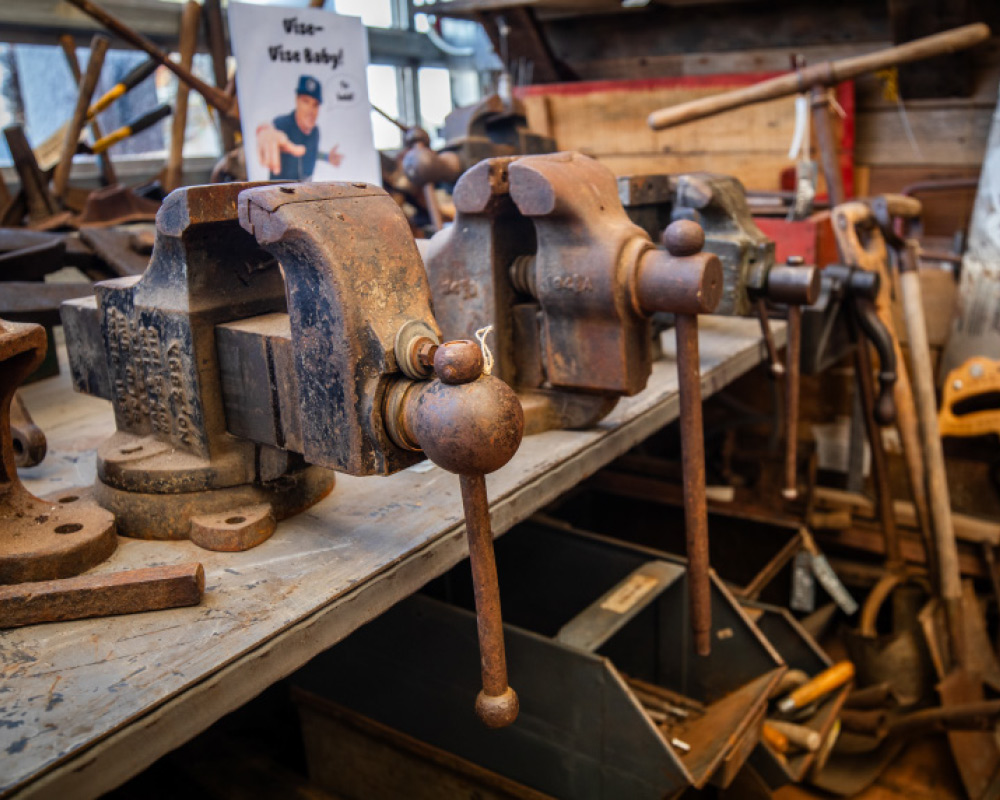
The Retail Experience
It’s easy to feel overwhelmed as you enter All American Reclaim’s retail showroom. Just about every corner of the former flower nursery and greenhouse is filled with curiosities.
Customers walk in the front door to find a room filled, floor to ceiling, with country/farmhouse fixtures, everything from iron garden sculptures and rusted metal decor to rusted road signs, old hand tools and salvaged fruit crates. Michaelis sees the look of awe every day.
“The biggest thing is to come in, walk around and take it all in,” he adds. “People are distracted when they come in here because there’s so much to look at and touch and feel and do. The best thing is to just come in and get your bearings. When you’re ready, come find us and we’ll help you out.”
Walk through another door and find a room full of hardware – nuts, screws, bolts – along with doorknobs, hinges, old lamps and shelves full of paint for DIY projects. In the corner and the aisle stand magnificent slabs of wood, some of them 2 to 3 inches thick and more than 12 feet long. They were saved from a tree service to become a dinner table, a bar or maybe a fireplace mantel.
Then, there are the greenhouses – all three of them – which are filled to the brim with aging doors, graying planks, and other items salvaged from old barns, factories and the like. Tin ceilings and rusted porcelain sinks mix with drill presses, spindles, pulleys, an adding machine, cash registers, even oddities like fishing poles and golf clubs. On one wall hangs a decaying sign for the Guest House Inn, a find from Manitowoc, Wis. Old barrel hoops and bicycles hang from the rafters overhead.
“We find a lot of cool stuff in these barns,” Michaelis says. “Back then, there wasn’t a home store that the farmer could go to. So, if they needed something they figured out how to make it. There are some amazing things we find.”
Barns are the predominant source, but there are plenty of other places to salvage in the Midwest, including old rail cars and a former Pillsbury factory in Springfield, Ill. – the remains of which are stacked inside the greenhouse and the yard outside. Other items are donated to the store or sold by people who are clearing out a loved one’s house.
“When a building in Chicago or someplace else has to come down, a lot of those big old timbers we can bring back here and cut up or make useful,” says Michaelis. “Sometimes, we’ll get waste products from woodworkers and we can give them another life, rather than throwing them into a landfill. And then a lot of the big slabs come from working with local tree companies. They’ll take down a big tree and we’ll saw it up. Most of the slabs we have here are from trees that are coming down. Rather than turn them into firewood, we can make them useful in other ways.”
Customers come from all over. They’re home carpenters or do-it-yourself crafters pursuing an idea. They’re professional decorators and designers. They’re owners of restaurants, like the Moretti’s in downtown Barrington and Tracks in downtown Cary. They’re even home remodeling firms like Advance Design Studio, based in Gilberts.
“We get a lot of creative customers,” says Michaelis. “I always joke that they come in here with one project but they leave with 10 projects, just because of all the stuff that’s here.”
The sales team can help to navigate customers around the showroom, but they can also help to connect someone with the on-site wood shop, where a pack of carpenters handle everything from a quick board trims to custom furniture buildouts. Just outside the wood studio, a corner is dedicated to recent projects, many of which include mantels and tables crafted from great slabs of reclaimed trees.
“One of the things that sets us apart from a lot of other companies that are similar to us is that we basically have everything on the showroom floor,” says Michaelis. “If you need wood, whether it be one piece or a thousand pieces, you can come in here and pick it up and take it with you right away. A lot of other places are made-to-order. All we do is clean up the wood minimally and sell it to you for whatever you want to do with it.”

Pursuing a Harvest
There’s a certain magic to the first barn you tear down. At least, there is for Michaelis. In fact, the old barn from northern Wisconsin has become a symbol for All American Reclaim, centered in the company’s logo, embroidered on the business owner’s shirt and plastered prominently upon his business card.
“That’s wood from the very first barn we did,” Michaelis says, pointing to a project across his office.
Though he’s taken apart many barns over the past decade, there’s still magic to this work. Every job is like a step back in time.
“My favorite part is going into a barn for the first time and seeing all of the stuff in there,” he says. “Every barn is different. You might walk in and find an old tool bench sitting in the corner and it’s exactly how somebody left it 40, 50 or maybe 60 years ago.”
Barely a day goes by when Michaelis isn’t approached about salvaging a family’s old barn. Surprisingly, not every barn is ripe for the picking. He generally stays within 3 to 4 hours of his Lake Barrington headquarters. Salvaging is a naturally risky job, so Michaelis also looks at the quality of the structure. Barns that are in poor physical shape, with extensive rotting inside, present a serious hazard.
“A barn that’s been in a family for generations, and they’ve kept it up with a good roof on it – that’s a good barn for us,” he says. “Once the roof starts going, you get holes in the roof and the weather starts getting in, and usually the rest of the barn follows pretty quickly.”
Michaelis considers the salvaging process an act of “de-carpentry,” because it’s in many ways the reverse of building a structure – like the suburban homes he constructed prior to the 2007 recession. He and his crew start by clearing out the barn and saving whatever they can. Then, they assess the best way to take apart the structure.
“You look at what’s going to happen over here if you start messing with something over here,” he says. “You kind of peel off all the siding and you expose the frame, and then you jump on the roof and start taking apart the frame piece by piece. Then, you take apart the floor, the floor joists and the sleepers, and you clean it all up.”
With a crew of six, give or take, Michaelis is typically done within four to six weeks, he says. That’s a lot slower than hiring a bulldozer, but there’s a lot that goes into the process. He says roughly 90% of materials are removed by hand or with minimal mechanical help. Everything is denailed, stacked, cleaned and transported back to Lake Barrington.
For the families who hire all American Reclaim, there are also personal reasons to invest the extra time and attention.
“I have to be cognizant of the family that’s there. They grew up there. They remember their grandpa and their great-grandpa and their parents working on the farm,” says Michaelis. “And now it’s come to the point that it’s got to come down. I’m excited to get it down and see what we can do with its pieces, and most of the time they’re excited, too. But there’s always a little bit of something that’s dying as they watch the structure come down.”
What he brings back to the Chicago area is a grab bag of surprises. There’s nothing “usual” about the types of wood you’ll find at these sites, or in the stories behind them. The only real commonality is that most timber was harvested nearby. That’s why you’re more likely to find oak and ash in northern Wisconsin, pine and Douglas fir in northern Illinois, sycamore and oak in southern Illinois and a mix of hardwoods near Galena.
“The craziest thing I ever found was a barn in Indiana. It was a barn that was made of all walnut,” says Michaelis. “It had these big 12-by-12-inch hand-cut walnut beams that were 40 feet long. The flooring was walnut, the roofing was walnut, the framing in there was all walnut. Once in a while I’ll get a walnut beam or something from a barn, but I’ve never seen anything like this, especially in pieces that big. So, that means when the barn was built in the early to mid-1800s that’s what was here at the time.”

Heart of a Leader
For the amazing things the All American Reclaim team finds, it’s still possible sometimes to have too much of a good thing.
“It’s not challenging to find good stuff to sell in the store because we’re finding new things every day,” says Michaelis. “I think the bigger challenge is turning stuff away. It took me a long time to be able to say no. I don’t have to have everything just because I want it or like it. That was a hard one for me to learn.”
Acquisitions are also tricky because inventory is so much different for a retailer of salvaged goods.
“It’s not like we can say, ‘Hey, we’re out of this so go call up the vendor and order more,’” he says. “You can’t do that in our field. You get something that is original and you have to do your research on it. You have to find a price point and then you have to keep track of it all.”
And then, of course, there are all the challenges that come with the rapid growth of a company that has essentially three core businesses: custom furniture, retail sales and wholesale salvaging.
It’s an operation Michaelis says was hard to imagine 10 years ago, when he started in a modest storefront in Crystal Lake. He soon outgrew that space and moved to a unit twice as big at the corner of Pingree and Rakow roads. He eventually took over two units, then three units, five units and space in the back parking lots. About four years ago, he relocated to the former Pasquesi nursery at the corner of U.S. Route 14 and Pepper Road in Lake Barrington.
“We weren’t necessarily looking at moving, but I drove my son to a birthday party nearby and I saw it was available,” he says. “I knew at that moment. I was like, ‘That’s our home.’ It had sat empty for a little while because there’s only so many businesses that can go into an old greenhouse. It was just perfect for us.”
Now, All American Reclaim has space to spread out on 3 acres, a fact that’s helped Michaelis to expand his market. The more space you have, the more you can accommodate big inventory, which then expands your range of customers, he says.
“We have beams out in the yard that are over 40 feet long. You’ve got to be able to store those,” he says. “And if you’re limited on space, then that’s going to be hard to grow. A lot of stuff in our industry is really big, and we’re always getting new stuff. If you want to acquire those things, you need space to store them.”
Whatever challenges may come in business, Michaelis approaches them with an eagerness to learn. In the early days, as he learned the art of deconstructing barns, he sought out mentors who could guide him along.
“I met up with somebody who showed me a little bit of the ropes and then I went off on my own,” he says. “There was another guy from Wisconsin who was full of information. The salvage world is a close-knit group of people. For the most part, everybody’s willing to help each other out.”
Michaelis carries that same ethos into his own business, where he leans on his Christian faith and a host of inspirational business leaders for insights. A stack of business-centered leadership books sits on his desk, topped by a leather-bound edition he reads daily. He seeks out podcasts on entrepreneurship and networks with other business owners for fresh perspectives.
“I try to believe in servant leadership where I’m here to help out my team,” he says. “Yes, they’re here to work for me, but ultimately I’m here for them, too, because without them doing their job this is nothing.”
In many ways, he treats his team of 15 like family – and it helps that his family also works there. Wife Eileen works in the office next door, and his son Talon works part-time on weekends. Another son, Tyler, works there when he’s home from college, and Mary, his high-school aged daughter, occasionally helps, too. The youngest, Frankie, makes 3-D printed dinosaurs to sell in the retail showroom next to a giant cast-iron tub filled with rubber ducks. The ducks sell for $1 each, with proceeds supporting a new charity each month.
“It’s definitely a family-oriented business, and I try to model that and instill that idea in my crew,” Michaelis says. “If they’ve got a family issue going on, family always comes first. Take care of what you need to. Work will always be here.”
The family knows, too, that a vacation may involve the occasional antique store, estate sale or garage sale. Call it a hazard of the trade – or else the joy of finding one’s calling, as Michaelis has.
“We’re not just wood here. We’ve got so many different things for big or small projects,” he says. “We work with commercial clients, we work with designers, architects and contractors as wells as ordinary homeowners. Whether you want just one piece or a thousand pieces we’ve got it here.”













